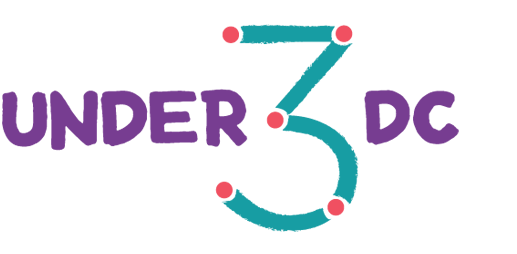By Natasha Riddle Romero, Community Organizer
When I first stepped into my role as a bilingual organizer with Under 3 DC, I was mostly unaware of the scale of issues the child care community, including early education teachers, face navigating programs and regulations. I was tasked with organizing Spanish-speaking parents, teachers, and providers around Birth-to-Three for All DC, aiming to expand quality early care and education in the District. For Spanish-speaking educators, the access problem is more significant than just choosing to participate in city programs like the child care subsidy program. After all, one cannot just choose to become a part of a system that makes participation hard because resources don’t exist in their language.
Immigrant communities rely on information shared among people to help us navigate and make sense of our new worlds. One person’s negative experience can discourage countless others. In essence, that is what is happening with Spanish-speaking early education teachers and professionals. It only took one–or a few who wanted to participate in the subsidy program to encounter insurmountable difficulties for others to choose not to bother. It is not the fault of the non-English or limited English speakers that the District’s programs aren’t managed with them in mind. And, it’s the children who suffer the most.
The barriers are endemic, and the implications far-reaching
When I met Damaris, a home-based early educator from Honduras living in Brightwood, it became apparent that not only were there insurmountable barriers for subsidy participation, but it was because of the lack of language access resources. Many obstacles exist in the licensing and compliance process, too. So many hurdles exist that the struggle is part of every day–it becomes almost banal like a thorn wedged so deep you learn to live with the discomfort. But Damaris and others who have chosen to become licensed, even those who have chosen to brave the subsidy program, do so because they are fiercely passionate about children and their communities.
However, their dedication is no longer enough. Given recent regulation changes requiring all teachers in early childhood settings to have at least a Child Development Associate’s degree by 2023 to remain in compliance with the Office of the State Superintendent of Education (OSSE) quality standards, many teachers are left scrambling to finish their degrees or risk losing their jobs. As with the child care subsidy and licensing system, navigating the higher education system can be difficult if resources are not available in your language.
Through our partnership with the Multicultural Spanish Speaking Providers’ Association (MSSPA), I learned about teachers’ difficulties in getting the proper credentials. Though many teachers have received financial assistance and a special bilingual degree track implemented at the University of the District of Columbia (UDC), teachers face many challenges in meeting the degree requirements. Everything from written communications from the scholarship organizations to UDC admissions is provided only in English. Only through tireless efforts by MSSPA and others have some of these challenges been addressed. Dozens of teachers are still waiting for admissions decisions from UDC. Many more wonder if they will be able to stay in the early education field–even with a compensation increase coming their way. They are having difficulty getting their degrees, and higher wages aren’t coming fast enough.
Many blame the pandemic for uncovering the structural inequities that permeate our city. But, when it comes to language access, those inequities are so baked into the American political system that to point them out is to merely blow off some dust off a well-worn, age-old American tradition of exclusion and xenophobia. After all, the District has language access legislation passed in 2004 to make the city less hostile to non-English speakers. Yet the District’s lack of compliance–financial investment, regulation, and oversight– in language access issues is a piecemeal approach to a widespread and deeply entrenched issue that is easy to ignore for the monolingual political class.
As the District struggles to implement the Birth-to-Three law and the entire country grapples with creating a more equitable system of child care and early education, language access laws are not being pursued with equal rigor, even though child care cannot be equitable without language justice.
And, for those of us who understand the language of exclusion, one which often whispers as loud as it yells, none of this comes as a surprise. It reminds us again that often systemic issues are kept in place by design, to trickle through communities, wedge them apart, until they become simply too difficult to fix. The District must make substantial investments into the Language Access Act of 2004 to ensure city programs, like the child care subsidy program, are accessible to all.
Por Natasha Riddle Romero, Organizadora Comunitaria
Cuando comencé a trabajar en el puesto de organizadora bilingüe en Under 3 DC, prácticamente ignoraba la magnitud de las dificultades que enfrenta la comunidad del cuidado infantil, incluidos los maestros de educación temprana, para comprender las reglamentaciones y orientarse y acceder a los programas. Me encargaron que organizara a los padres, los maestros y los proveedores de habla hispana en torno a la Ley Birth-to-Three for All DC, con el objetivo de ampliar los servicios de cuidado infantil y educación temprana de calidad del Distrito. Para los educadores de habla hispana, el problema del acceso es más significativo y no se trata tan solo de elegir participar en programas de la ciudad, como el programa de subsidios para cuidado infantil. Después de todo, uno no puede sencillamente elegir formar parte de un sistema que dificulta la participación porque no existen los recursos en su idioma.
En las comunidades de inmigrantes confiamos en la información que va compartiendo la gente, y esta información nos ayuda a transitar y darles sentido a nuestros nuevos mundos. La experiencia negativa de una persona puede desalentar a innumerables otras. En esencia, esto es lo que está sucediendo con los profesionales y los maestros de educación temprana de habla hispana. Solo fue necesario que uno o algunos quisieran participar en el programa de subsidios y se encontraran con dificultades imposibles de superar para que los demás optaran por no tomarse la molestia. No es culpa de las personas que no hablan inglés o que tienen un dominio limitado del idioma que no se los tenga en cuenta al administrar los programas del Distrito. Y son los niños quienes más se perjudican.
Las barreras son endémicas, y sus consecuencias, de gran alcance.
Cuando conocí a Damaris, educadora en la guardería infantil que funciona en su casa, nacida en Honduras y residente de Brightwood, vi con claridad que no solo había barreras imposibles de franquear para participar en el programa de subsidios, sino que era debido a la falta de recursos con acceso lingüístico. También hay muchos obstáculos en el proceso de otorgamiento de licencias y cumplimiento. Hay tantas trabas que la lucha forma parte del día a día: se convierte en algo casi banal como una espina clavada tan profundamente que uno aprende a vivir con el malestar. Pero Damaris y otras personas que han optado por obtener una licencia, incluso aquellos que han elegido desafiar al programa de subsidios, lo hacen porque sienten una inmensa pasión por los niños y sus comunidades.
Sin embargo, su dedicación ya no es suficiente. Con los cambios recientes en las reglamentaciones que exigen que todos los maestros que trabajan en centros de educación temprana obtengan al menos un título de Asociado en Desarrollo Infantil antes de 2023 para seguir cumpliendo con los estándares de calidad de la Oficina del Superintendente Estatal de Educación (OSSE), quedan en el camino muchos maestros que intentarán terminar a duras penas sus estudios o que se arriesgarán a perder el trabajo. Tal como sucede con el programa de subsidios para cuidado infantil y con el sistema de otorgamiento de licencias, transitar el sistema de educación superior puede ser difícil si no hay recursos disponibles en nuestro idioma.
A través de nuestra asociación con Multicultural Spanish-Speaking Providers Association (MSSPA), aprendí sobre las dificultades de los maestros para obtener las credenciales adecuadas. Si bien muchos maestros han recibido asistencia económica y se ha implementado un curso especial para la obtención de un título bilingüe en la Universidad del Distrito de Columbia (UDC), los maestros enfrentan muchos desafíos para satisfacer los requisitos académicos. Todo, desde las comunicaciones escritas de las organizaciones que otorgan becas hasta las admisiones de la UDC, se provee únicamente en inglés. Solo mediante los esfuerzos incansables de MSSPA y de otras organizaciones se han abordado algunos de estos desafíos. Decenas de maestros aún esperan decisiones de la UDC sobre su admisión. Muchos más se preguntan si podrán seguir trabajando en el sector de la educación temprana —incluso con el aumento que percibirán en la compensación—. Tienen dificultades para obtener los títulos que necesitan, y el aumento de sueldo no está llegando con suficiente rapidez.
Muchos culpan a la pandemia por dejar al descubierto las desigualdades estructurales que impregnan nuestra ciudad. Sin embargo, en lo que respecta al acceso lingüístico, estas desigualdades son tan inherentes al sistema político americano que señalarlas es simplemente quitar algo de polvo de una raída y antigua tradición americana de exclusión y xenofobia. Después de todo, el Distrito tiene una legislación sobre acceso lingüístico que fue aprobada en 2004 y cuyo objetivo es lograr que la ciudad sea menos hostil con quienes no hablan inglés. No obstante, la falta de cumplimiento por parte del Distrito —inversión económica, reglamentación y supervisión— en los asuntos relativos al acceso lingüístico es un enfoque fragmentado a un problema generalizado y profundamente arraigado que es fácil de ignorar para la clase política monolingüe.
Mientras el Distrito se esfuerza por implementar la ley Birth-to-Three y el país entero pelea por la creación de un sistema de cuidado infantil y educación temprana más equitativo, no se está luchando con la misma rigurosidad por la implementación de las leyes de acceso lingüístico, a pesar de que no es posible un cuidado infantil equitativo sin justicia lingüística.
Y a quienes comprendemos el lenguaje de la exclusión, que suele hacerse oír con la misma intensidad en un susurro o en un grito, nada de esto nos asombra. Nos recuerda una vez más que a menudo los problemas sistémicos se mantienen a propósito, para que vayan filtrándose en las comunidades, apartando a unos de otros, hasta que sencillamente se vuelven demasiado difíciles de arreglar. El Distrito debe hacer inversiones sustanciales en la Ley de Acceso Lingüístico de 2004 para garantizar que los programas de la ciudad, como el programa de subsidios para cuidado infantil, sean accesibles para todos.


